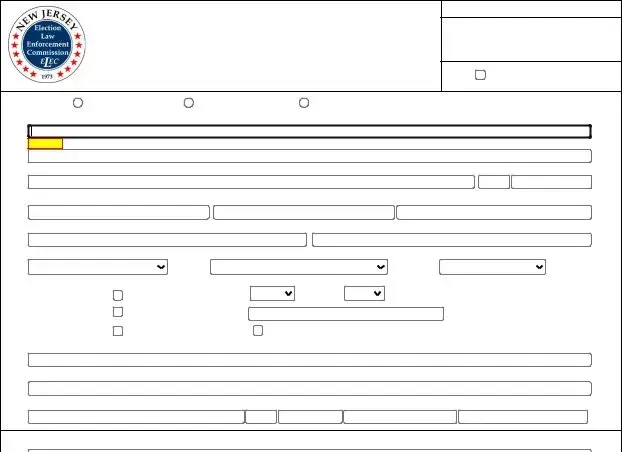Fill Out a Valid New Jersey D 3 Template
In the realm of political campaigning and finance in New Jersey, the New Jersey D-3 Form plays a pivotal role, ensuring transparency and legality in the operations of political party committees. This document, overseen by the New Jersey Election Law Enforcement Commission (ELEC), serves as a crucial tool for political parties at the state, county, and municipal levels. It mandates the designation of a committee's treasurer and the identification of a depository—essentially, a bank account where the committee's funds are held. Additionally, it covers the appointment of a deputy treasurer, amendments to previously submitted information, and the annual designation of these officers and accounts. The form also includes a section for certifying the accuracy of the information provided, underscoring the legal responsibilities of the chairperson and treasurer. Compliance with training requirements for treasurers of State Political Party Committees is also emphasized, reflecting the commission's commitment to maintaining an informed and accountable financial management system within New Jersey's political entities. The intricate requirements and affirmations within the form underscore its central role in promoting financial integrity and accountability among New Jersey's political parties.
Sample - New Jersey D 3 Form

|
POLITICAL PARTY COMMITTEE - |
FORM |
||||
|
DESIGNATION OF ORGANIZATIONAL |
|
|
|||
|
TREASURER AND DEPOSITORY |
|
|
|||
NEW JERSEY ELECTION LAW ENFORCEMENT COMMISSION |
|
|
||||
|
P.O. Box 185, Trenton, NJ |
|
|
|
||
|
(609) |
Amendment |
||||
|
|
Website: www.elec.nj.gov |
|
|||
State Committee |
County Committee |
Municipal Committee |
|
|
||
Committee Name |
|
|
|
|
|
|
StreetRequired;Address |
|
|
|
|
|
|
City |
|
|
|
|
State |
Zip Code |
|
|
|
|
|
NJ |
|
*Day Telephone |
|
*Evening Telephone |
ELEC Identification Number |
|
||
Committee Email (Optional) |
|
|
Committee Website (Optional) |
|
|
|
County |
|
Municipality |
|
|
Political Party |
|
Type of Filing: |
|
|
to June 30, |
|
|
|
Annual Designation for July 1, |
|
|
|
|||
|
|
|
|
|||
Amendment (please specify) |
|
|
|
|
||
Additional Depository |
Deputy Treasurer |
|
|
|
||
|
|
|
|
|
||
Chairperson Name |
|
|
|
|
|
|
Mailing Address |
|
|
|
|
|
|
City |
|
State |
Zip Code |
*Day Telephone |
*Evening Telephone |
|
Treasurer Name |
|
|
|
|
|
|

Mailing Address |
|
|
|
|
City |
State |
Zip Code |
*Day Telephone |
*Evening Telephone |
Resident Address |
|
|
|
|
City |
|
|
State |
Zip Code |
Depository Information
Name of Bank or Depository
Mailing Address
City |
State |
Zip Code |
Day Telephone |
Account Name
Account Number
*Leave this field blank if your telephone number is unlisted. Pursuant to N.J.S.A.
New Jersey Election Law Enforcement Commission |
Page 1 of 2 |
sForm |
Depository Information (continued)
Name of Bank or Depository
Mailing Address
City |
State |
Zip Code |
Day Telephone |

Account Name
Account Number
LIST THE NAME(S), MAILING ADDRESS(ES) AND TELEPHONE NUMBER(S) OF ANY PERSON(S) AUTHORIZED TO SIGN CHECKS OR OTHERWISE MAKE TRANSACTIONS
Name
Mailing Address
City |
State Zip Code |
*Day Telephone |
*Evening Telephone |
Name
Mailing Address
City |
State Zip Code |
*Day Telephone |
*Evening Telephone |
Name
Mailing Address
City |
State Zip Code |
*Day Telephone |
*Evening Telephone |
CHAIRPERSON/TREASURER CERTIFICATION: I certify that the statements on this document are true. I am aware that if any of the statements are willfully false, I may be subject to punishment.

Registration Number |
PIN |
Chairperson |
Date |
Registration Number |
PIN |
Treasurer |
Date |
Treasurers for State Political Party Committees are required to receive training with the NJ ELEC. If you have completed the training enter your Treasurer Training ID# 
*Leave this field blank if your telephone number is unlisted. Pursuant to N.J.S.A.
New Jersey Election Law Enforcement Commission |
Page 2 of 2 |
sForm |
File With ELEC
Document Specifications
| Fact | Detail |
|---|---|
| Purpose | The New Jersey Form D-3 is used for the designation of a treasurer and depository by political party committees. |
| Governing Law | It is governed by the New Jersey Election Law Enforcement Commission according to N.J.S.A. 47:1A-1.1. |
| Required Information | Committee name, address, telephone numbers, ELEC Identification Number, political party, and details regarding chairperson, treasurer, and depository information are necessary. |
| Privacy Protection | Unlisted telephone numbers must not be provided, in adherence to N.J.S.A. 47:1A-1.1, safeguarding personal information. |
| Treasurer Training | Treasurers for State Political Party Committees are mandated to undergo training with the Commission and provide their Treasurer Training ID#. |
| Certification Requirement | Both the treasurer and the chairpers
Detailed Steps for Using New Jersey D 3When a political party committee in New Jersey needs to designate or change its treasurer and depository, it is required to fill out and submit the Form D-3 to the New Jersey Election Law Enforcement Commission. This document ensures that all committee financial activities are transparent and accountable. Proper completion and submission of the form is crucial for compliance with state regulations. Follow these steps to accurately fill out the form.
After completing all sections of the Form D-3, review the information for accuracy and completeness. Once confirmed, submit the form to the address provided at the top of the document: New Jersey Election Law Enforcement Commission, P.O. Box 185, Trenton, NJ 08625-0185. Timely submission of the Form D-3 is essential for maintaining compliance with New Jersey's election laws and regulations. Learn More on New Jersey D 3What is the New Jersey Form D-3?The New Jersey Form D-3 is used by political party committees to designate their organizational Treasurer and Depository. It's a necessary form for state political committees, including State, County, and Municipal Committees, to comply with the New Jersey Election Law Enforcement Commission's (ELEC) regulations. Who needs to fill out the Form D-3?All political party committees in New Jersey, such as State Committees, County Committees, and Municipal Committees, are required to complete the Form D-3. This includes making designations for their organizational Treasurer, Depository, and any changes like additions of a Deputy Treasurer or amendments to depository information. What information is needed to complete the Form D-3?
Where should the Form D-3 be submitted?The completed Form D-3 should be submitted to the New Jersey Election Law Enforcement Commission at P.O. Box 185, Trenton, NJ 08625-0185. You can also contact them directly at (609) 292-8700 or toll-free within NJ at 1-888-313-ELEC (3532) for further guidance. Can the Form D-3 be filled out online?As of the latest guidelines, the Form D-3 needs to be either typed or printed physically. Electronic submissions are not mentioned in the provided instructions, so it's best to follow the traditional mail-in method for this specific form. Is there a deadline for submitting the Form D-3?While the form itself does not specify a submission deadline, it references an "Annual Designation for July 1 to June 30," indicating that committees should update and submit their designations annually within this timeframe. For specific deadlines or requirements, contact the New Jersey Election Law Enforcement Commission directly. What are the consequences of not submitting the Form D-3?Failure to submit the Form D-3, or submitting it with false information, can result in legal penalties. The form clearly states that if any statements are willfully false, the individuals responsible may be subject to punishment under New Jersey law. Are treasurers required to receive training?Yes, treasurers for State Political Party Committees are required to undergo training with the New Jersey Election Law Enforcement Commission. Upon completion, treasurers should indicate their training completion on the Form D-3 and provide their Treasurer Training ID#. Common mistakesWhen filling out the New Jersey D-3 form, which is used for designating an organizational treasurer and depository for political party committees, various mistakes can occur. These errors can lead to delays or complications in the processing of the form. Below are four common mistakes:
To ensure the smooth processing of the New Jersey D-3 form, attention to detail in completing it accurately and thoroughly is crucial. Ensuring that all required fields are correctly filled out and that necessary information is provided can help avoid these common pitfalls. Documents used along the formWhen handling political committee affairs in New Jersey, particularly with the New Jersey D-3 form related to the designation of organizational treasurer and depository, several other documents are often required or utilized alongside it to ensure compliance and thorough record-keeping in alignment with state election law requirements. Understanding these documents is crucial for the smooth operation and legal compliance of any political party committee operating within the state.
Comprehensive understanding and proper management of these documents, alongside the New Jersey D-3 form, ensure that political party committees remain in good standing with the New Jersey Election Law Enforcement Commission. Accurate and diligent documentation supports the integrity of the political process, promoting transparency and accountability within the state's election framework. Similar formsThe Form D-3 shares strong similarities with the Federal Election Commission (FEC) Form 1, Statement of Organization, commonly used by federal political committees. Both forms are pivotal for the operation of political committees, setting the legal groundwork for campaign activities. They require the identification of a committee's essential officers, including the treasurer, and the naming of a principal campaign depository. This foundational step ensures transparent and regulated financial operations, crucial for maintaining public trust in political entities. While the Form D-3 is specific to New Jersey, the FEC Form 1 caters to committees that operate on a national level, demonstrating the parallel structure of political organization across different governance levels. Another document bearing resemblance to the New Jersey D-3 form is the Statement of Organization for Political Action Committees (PACs) at the state level in various jurisdictions. This document, much like the D-3, mandates the disclosure of key information about a PAC, such as its name, officers, and banking details. It is a critical step for PACs to gain legitimacy and to operate within the legal framework set by state election commissions. This similarity underscores the uniform requirement across states to ensure political committees are accountable in their financial dealings and leadership structure, establishing a common ground in political finance law. The Corporate Registration Form, used by businesses to officially register with a state's Secretary of State or equivalent department, shares commonalities with the D-3 form, albeit in a different realm of application. Both forms capture essential information about the organization, including designation of key personnel and contact details. While the Corporate Registration Form is focused on enabling legal recognition and operation of businesses within a state, the D-3 form targets political committees' compliance with election laws, illustrating the broad applicability of structured organizational documentation across different sectors. The Campaign Treasurer’s Report, another key document in the domain of campaign finance, parallels the New Jersey D-3 form in its focus on financial accountability. Though primarily aimed at reporting campaign contributions and expenditures, it similarly necessitates comprehensive banking information and authorization details for those handling funds. This demonstrates a shared goal between the two documents: to foster transparency and integrity in the management of financial resources, a cornerstone principle in both campaign operations and broader electoral integrity efforts. Lastly, the IRS Form 8871, Political Organization Notice of Section 527 Status, though federal and focused on tax status, echoes elements of the D-3 form in its requirement for organizational details. Both serve as declarations of an entity's intent and operational framework within their respective jurisdictions. The IRS form, by identifying a political organization’s officers and contact information, ensures transparency in financial activities to the federal government, mirroring the D-3’s objective of accountability at the state level. This parallel highlights the interconnectedness of financial transparency and regulatory compliance across different areas of governance and administration. Dos and Don'tsWhen filling out the New Jersey D-3 form, known as the Political Party Committee - Designation of Organizational Treasurer and Depository, taking the correct steps ensures compliance with the New Jersey Election Law Enforcement Commission requirements. Care and attention to detail will streamline the process and avoid common pitfalls. Do:
Don't:
MisconceptionsUnderstanding the New Jersey D-3 Form, associated with the designation of organizational treasurers and depository for political party committees, can often be clouded by misconceptions. It's essential to demystify these comprehension barriers for better clarity and compliance.
Correcting these misconceptions ensures political party committees navigate New Jersey's election laws more effectively, promoting transparency, accountability, and compliance in the political process. Key takeawaysFilling out and using the New Jersey D-3 form is crucial for political party committees to properly designate their organizational treasurer and depository. Here are four key takeaways to bear in mind:
Compliance with the provisions of the New Jersey D-3 form ensures the transparency and accountability of political party committee operations, in alignment with state election laws. Therefore, careful completion and submission of this form is crucial. Popular PDF DocumentsNjar Forms - Ensures compliance with federal and state regulations regarding property transactions. New Jersey Filing Requirements - For entities with more than 25 participants, filing requirements mandate submission via diskette, adhering to specific guidelines. Nj Private Investigator Requirements - New Jersey's SP-171 form is an essential step towards obtaining a private detective license, demanding thorough details on the applicant's past and future endeavors. |